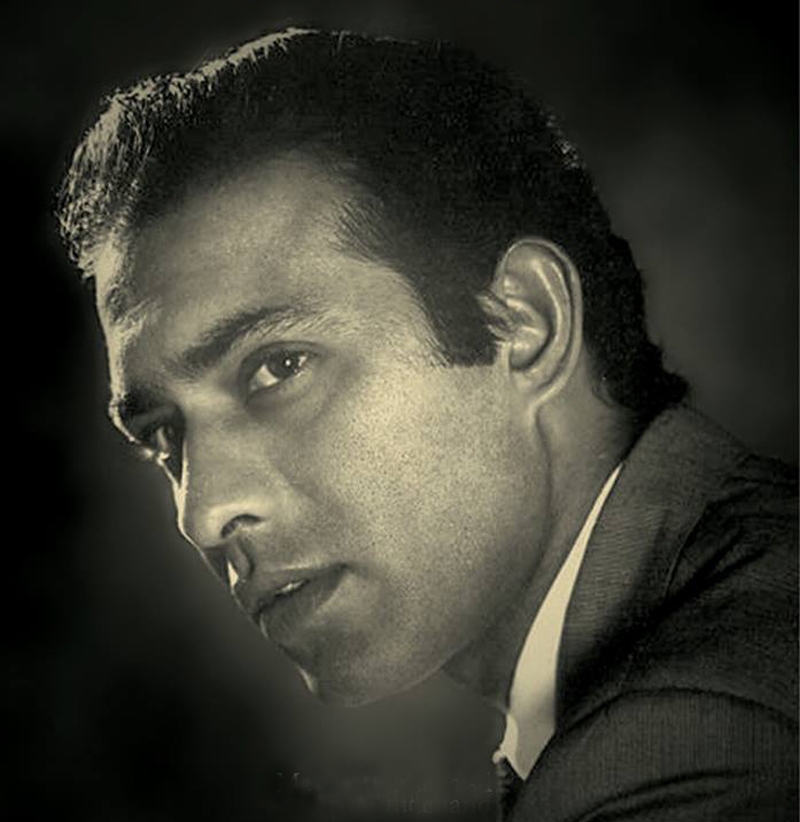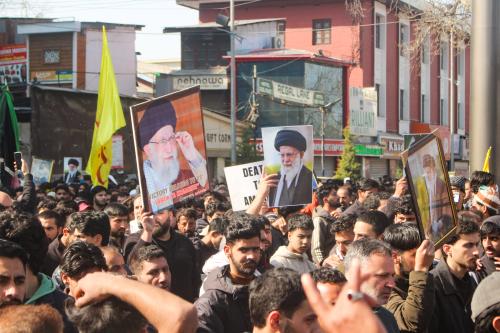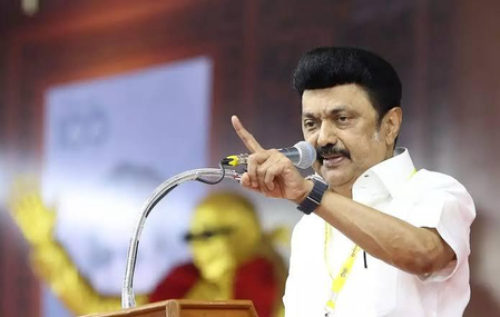VIKAS DATTA With his velvety, soulful and ethereal voice, marked by a slight quaver, Talat Mahmood was well suited for the elegant poetic compositions that are the bedrock of Hindi film music, and rose to great heights initially. But given the fickleness of popularity and public demand, his singing career was stilled prematurely. In his heyday, in the early 1950s, Talat Mahmood served as the voice for all the leading stars, as well as the emerging ones. "Ae mere dil kahin aur chal", "Main dil hoon ek armaan bhara" and "Jaayen to jaayen jahan" were picturised on the trinity of Dilip Kumar, Raj Kapoor and Dev Anand in "Daag", "Anhonee" and "Taxi Driver", respectively. "Chal diyaa karvan, lut gaye ham yahan" sung for Shammi Kapoor in "Lailaa Majnoon" and "Jalte hain jiske liye" for Sunil Dutt in "Sujata" are melodies that resonate even today. After roughly a decade or so in the limelight, Talat Mahmood saw music composers root for other voices -- Shankar-Jaikishan made Mukesh Raj Kapoor's voice, Naushad plumped for Rafi for Dilip Kumar, and Rafi became the voice of choice for Dev Anand as well (before Kishore Kumar stepped in) and also Shammi Kapoor. Talat Mahmood's voice increasingly was heard less and less in films, and more in concerts. On the other hand, as an early prototype of the "chocolate boy" hero, he had also acted in a number of films. Some became hits, but they were not that successful as to make him a viable hero. Though he still hung on gamely till the 1970s, there were not many takers for him, leading to his eventual formal retirement. That was a tragedy, not only for Talat Mahmood, who passed away on this day (May 9) in 1998, but also for his considerable legions of admirers. There may be many reasons why he lost favour with music composers, or why he did not click in his on-screen presence. One might be that the sort of resigned acquiescence or restrained angst he was so good at enunciating was ceding ground to a more assertive approach. Rather than try to ascertain the reasons, let us recall Talat Mahmood the singer, at his silken best, with 10 representative songs, picturised on leading actors of his time and even those not so famous. "Shaam-e-gam ki qasam, aaj gamgin hai ham": From "Footpath" (1953), starring Dilip Kumar and Meena Kumari, this is acknowledged to be one of the finest ghazals rendered in Hindi films. Featuring a pensive and reflective Dilip Kumar, the sombre lyrics are by Majrooh Sultanpuri and the haunting music is by Khaiyyam. "Seene mein sulagte hain armaan": Many might know this more from the Jagjit Singh version, but this lyrical duet, picturised on Dilip Kumar and Madhubala in the film "Taraana" (1951), sees Talat Mahmood paired with Lata Mangeshkar in this masterfully restrained yet painful expression of thwarted love. Prem Dhawan penned the exquisite lyrics and Anil Biswas was the music director. "Andhe jahan ke andhe raaste": This doesn't only resemble the heart-rending disquiet of "Jayen to jaayen kahan", but actually uses the same lyrics in the second half of the song, being reprised in the latter part of the 'antra'. The film was "Patita" (1953), starring Dev Anand and Usha Kiran, with the redoubtable Shankar-Jaikishan responsible for the music and Shailendra Singh for the lyrics. "Ai gham-e-dil kya karun": Much before Rafi's "Yahoo ... chahe koi mujhe jangli kahe" or the jazzy strains of "Chinatown", Shammi Kapoor tasted his earliest success with this melancholy and rhythmic look at the alienation of big city life, based on the first two stanzas of Majaz Lakhnavi's nazm "Awaraa". Who else but Talat Mahmod, who was Lucknow-born, could do justice to lyrics like "Ye ruupahli chhanv ye akash par taaron ka jaal/Jaise sufi ka tasavvur, jaise aashiq kaa khayal..." The film was "Thokar" (1953), and the composer was Sardar Malik, the father of Anu Malik. "Dil-e-naadan tujhe hua kya hai": The best female complement to Talat Mahmood's voice was provided by Suraiyya. And while in "Mirza Ghalib" (1954), a heartfelt-though romanticised tribute to the great poet, she steals the limelight with renditions of his ghazals, such as "Aah ko chahiye ek umr asar hone tak" and "Yeh na thi hamari qismat ke visaal-e-yaar hotaa", Talat Mahmood holds his ground in this duet, which, believe it or not, became so famous that it used to blare in cricket grounds in Pakistan during breaks in the matches. The music was by Ghulam Mohammad. "Zindagi dene vaale sun": And this, picturised on Talat Mahmood himself, in his film "Dil-e-Nadaan" (1953), could be a representative account of the coming stagnation of his career. "Raat katti nahi din guzarta nahi/zakhm aisa diya hai ke bharta nahi" rendered in his sad but never maudlin tone. Shakil Badayuni wrote the lyrics and Ghulam Mohammad the tune. "Bechain nazar betaab jigar": It's moot if hero Suresh is remembered beyond the circles of 1950s film aficionados or historians, but this swinging melody from "Yasmin" (1955), an Arabian Nights-type story that Bollywood was prone to make for a long time, is still recognisable. A signature Talat Mahmood piece, it has lyrics of Jan Nisar Akhtar, and the peppy music of C. Ramchandra. "Mohabbat hi na jo samjhe, vo zalim pyar kya jaane": This was from V. Shantaram's "Parchhain" (1952) starring the filmmaker, who was not only renowned but an institution in himself, along with regular female lead, Sandhya and Talat pulled of these downhearted lyrics with his customary finesse. Written by Noor Lakhnavi, it had a C. Ramchandra score. "Tasveer banata hoon tasveer nahi banti": From "Baradari" (1955), this was picturised on Ajit, who did play some romantic roles before switching to greater fame as one of the suave, soft-spoken but sinister Bollywood badmen, of the "Monaa daarling" and "Loin" trademark. How Talat carries off this sensitive piece for such a rugged hero is a mark of his ability. Khumar Barabankvi is behind the words and music by Nashad (not the more famous Naushad), who later made a successful career in the Pakistani film industry. "Itna na mujhse tu pyaar badha": An example of how Indian composers get inspired by Western classical music (in this case, Salil Chowdhury and Mozart's Symphony No. 40), this song from the film "Chhaya" (1961), starring Sunil Dutt and Asha Parekh, was one of Talat's last famous songs before the long sunset of his career. (Vikas Datta can be contacted at vikas.d@ians.in)
Talat Mahmood: The velvet voice of Indian cinema and his curtailed career
- by Rinku
- May 10, 2022 2 minutes

Talat Mahmood: The velvet voice of Indian cinema and his curtailed career











